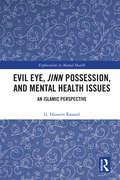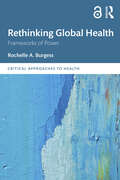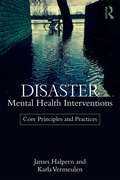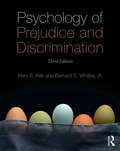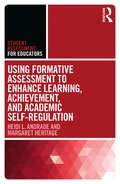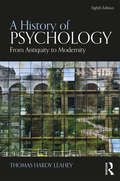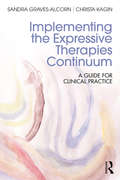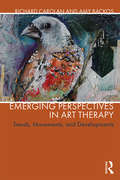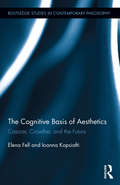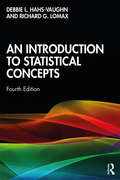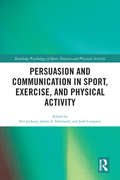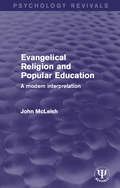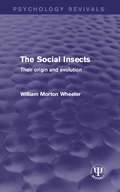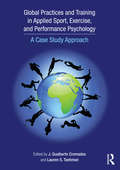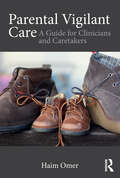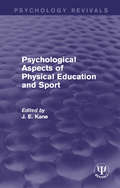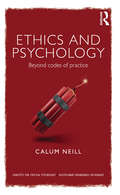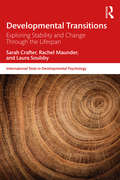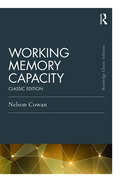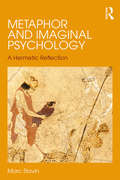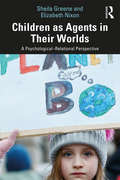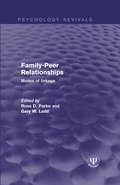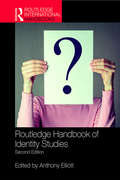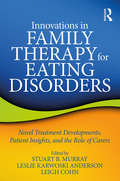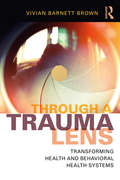- Table View
- List View
Evil Eye, Jinn Possession, and Mental Health Issues: An Islamic Perspective (Explorations in Mental Health)
by G. Hussein RassoolEvil Eye, Jinn Possession, and Mental Health Issues raises awareness of the cultural considerations, religion and spirituality involved in the assessment of Muslim patients with mental health problems. The belief that Jinn spirits can cause mental illness in humans through affliction or possession is widely accepted among Muslims, meaning this belief is a crucial, but frequently overlooked, aspect of mental health problems with Muslim patients in psychiatric care. This book explores the nature of such beliefs, their relationship to mental health and the reasons for their importance in clinical practice. The book argues that it is vital to consider mental disorders as a multifactorial affair, in which spiritual, social, psychological and physical factors may all play a role. It suggests differential diagnostic skills may have an important part to play in offering help to those who believe their problems are caused by possession, and provides accessible literature on clinical issues and practice, interventions, management and evidence-based practice to help health workers achieve a better understanding of Muslim beliefs about possession and how to work with patients that hold such beliefs. Evil Eye, Jinn Possession, and Mental Health Issues is an essential manual for mental health professionals, social workers and psychologists. It should also be of interest to academics and students in the healthcare sciences.
Rethinking Global Health: Frameworks of Power (Critical Approaches to Health)
by Rochelle A. BurgessThis book reflects and analyses the working of power in the field of global health– and what this goes on to produce. In so doing, Rethinking Global Health asks the pivotal questions of, ‘who is global health for’ and ‘what is it that limits our ability to build responses that meet people where they are?’ Covering a wide range of topics from global mental health to Ebola, this book combines power analyses with interviews and personal reflections spanning the author’s decade-long career in global health. It interrogates how the search for global solutions can often end up far from where we anticipated. It also introduces readers to different frameworks for power analyses in the field, including an adaptation of the ‘matrix of domination’ for global health practice. Through this work, Dr Burgess develops a new model of Transformative Global Health, a framework that calls researchers and practitioners to adopt new orienting principles, placing community interests and voices at the heart of global health planning and solutions at all times. This book will be beneficial to students and academics working in the global and public health landscape. It will also hold appeal to activists, practitioners and individuals invested in the discipline and in health equity around the world.
Disaster Mental Health Interventions: Core Principles and Practices
by James Halpern Karla VermeulenDisaster Mental Health Interventions uses DSM-5 diagnostic criteria and the latest research to help build disaster mental health intervention skills that will last a lifetime. Students and emerging professionals across the fields of mental health counseling, social work, school counseling, spiritual care, and emergency management will appreciate the accessible tone, level of detail, and emphasis on practice. Case studies and anecdotes from experienced professionals add an additional level of depth and interest for readers.
Psychology of Prejudice and Discrimination: 3rd Edition
by Bernard E. Whitley Jr. Mary E. KiteThe Psychology of Prejudice and Discrimination provides a comprehensive and compelling overview of what psychological theory and research have to say about the nature, causes, and reduction of prejudice and discrimination. It balances a detailed discussion of theories and selected research with applied examples that ensure the material is relevant to students. Newly revised and updated, this edition addresses several interlocking themes, such as research methods, the development of prejudice in children, the relationship between prejudice and discrimination, and discrimination in the workplace, which are developed in greater detail than in other textbooks. The first theme introduced is the nature of prejudice and discrimination, which is followed by a discussion of research methods. Next comes the psychological underpinnings of prejudice: the nature of stereotypes, the conditions under which stereotypes influence responses to other people, contemporary theories of prejudice, and how values and belief systems are related to prejudice. Explored next are the development of prejudice in children and the social context of prejudice. The theme of discrimination is developed via discussions of the nature of discrimination, the experience of discrimination, and specific forms of discrimination, including gender, sexual orientation, age, ability, and appearance. The concluding theme is the reduction of prejudice. An ideal core text for junior and senior college students who have had a course in introductory psychology, it is written in a style that is accessible to students in other fields including education, social work, business, communication studies, ethnic studies, and other disciplines. In addition to courses on prejudice and discrimination, this book is also adapted for courses that cover topics in racism and diversity. For additional resources, consult the website BreakingPrejudice.org, which focuses on pedagogical materials that can be used to address both cultural awareness and self-awareness of prejudice and to increase students' multicultural competence. Specifically, the site includes: Original teaching activities (ready to use with minimal preparation, including discussion questions) An annotated list of podcasts (categorized by topic) An annotated list of videos (categorized by topic) A set of social justice songs (categorized by topic) Four original public service announcements 16 video diaries about people's personal experience with prejudice Interviews with 13 social justice activists
Using Formative Assessment to Enhance Learning, Achievement, and Academic Self-Regulation (Student Assessment for Educators)
by Heidi L. Andrade Margaret HeritageThere is convincing evidence that carefully applied classroom assessments can promote student learning and academic self-regulation. These assessments include, but are not limited to, conversations with students, diagnostic test items, and co-created rubrics used to guide feedback for students themselves and their peers. Writing with the practical constraints of teaching in mind, Andrade and Heritage present a concise resource to help pre- and in-service teachers maximize the positive impacts of classroom assessment on teaching. Using Formative Assessment to Enhance Learning, Achievement, and Academic Self-Regulation translates work from leading specialists and explains how to use assessment to improve learning by linking learning theory to formative assessment processes. Sections on goal setting, progress monitoring, interpreting feedback, and revision of goal setting make this a timely addition to assessment courses.
A History of Psychology: From Antiquity to Modernity
by Thomas Hardy LeaheyA History of Psychology places social, economic, and political forces of change alongside psychology’s internal theoretical and empirical arguments, illuminating how the external world has shaped psychology’s development, and, in turn, how the late twentieth century’s psychology has shaped society. Featuring extended treatment of important movements such as the Enlightenment and the Scientific Revolution, the textbook approaches the material from an integrative rather than wholly linear perspective. The text carefully examines how issues in psychology reflect and affect concepts that lie outside the field of psychology’s technical concerns as a science and profession. This new edition features expanded attention on psychoanalysis after its founding as well as new developments in cognitive science, artificial intelligence, and behavioral economics. Throughout, the book strengthens its exploration of psychological ideas and the cultures in which they developed and reinforces the connections between psychology, modernism, and postmodernism. The textbook covers scientific, applied, and professional psychology, and is appropriate for higher-level undergraduate and graduate students.
Implementing the Expressive Therapies Continuum: A Guide for Clinical Practice
by Sandra Graves-Alcorn Christa KaginImplementing the Expressive Therapies Continuum aims to explore the use of the Expressive Therapies Continuum (ETC) in the form of specific expressive therapy initiatives intended to be used in both educational and professional settings. Drawing on materials co-developed by Dr. Sandra Graves-Alcorn, co-author and developer of the ETC, as well as tried and tested curriculum by Professor Christa Kagin, this interdisciplinary resource will be of great value to students, teachers, mental health clinicians, as well as other healthcare practitioners interested in utilizing the ETC developmental model. All of this is delivered in a clear and easy to follow presentation designed to engage readers.
Emerging Perspectives in Art Therapy: Trends, Movements, and Developments
by Richard Carolan Amy BackosEmerging Perspectives in Art Therapy aims to document newly emerging trends in the field of art therapy and to offer a vision of the future practices. This exciting new volume contains a diverse selection of chapters written to examine the current transitional phase of the profession where new paradigms of thinking and research methods are emerging due to the continued examination of old assumptions and development of new knowledge. Specific attention is paid to emergent knowledge in the areas of neuropsychological applications, philosophical foundations, research, multicultural and international practices, and art as therapy in allied professions.
The Cognitive Basis of Aesthetics: Cassirer, Crowther, and the Future (Routledge Studies in Contemporary Philosophy)
by Elena Fell Ioanna KopsiaftiThis book seeks to fill a void in contemporary aesthetics scholarship by considering the cognitive features that make the aesthetic and artistic worthy of philosophical study. Aesthetic cognition has been largely abandoned by analytical philosophy, which instead tends to focus its attention on the ‘non-exhibited’ properties of artwork or issues concerning semantic and syntactic structure. The Cognitive Basis of Aesthetics innovatively seeks to correct the marginalization of aesthetics in analytical philosophy by reinterpreting aesthetic cognition through an integration of Ernst Cassirer’s philosophy of symbolic forms with Paul Crowther’s theory of imagination and philosophy of art. This integration has three important outcomes: 1) it explains why the aesthetic and artistic constitute a unique form of knowledge; 2) it shows the role this plays in the formation of aesthetics as a discipline; and 3) it describes why aesthetic cognition is so deeply engaging. This book’s unique theoretical approach engages with important works of visual, conceptual, and digital art, as well as literature, music, and theatre.
An Introduction to Statistical Concepts: Third Edition
by Debbie L. Hahs-Vaughn Richard G. LomaxThe new edition of An Introduction to Statistical Concepts, is designed to help students really understand statistical concepts, the situations in which they can be used, and how to apply them to data. Hahs-Vaughn and Lomax discuss the most popular, along with many of the lesser-known, procedures and models, whilst also exploring nonparametric procedures used when standard assumptions are violated. They provide in-depth coverage of testing assumptions and highlight several online tools for computing statistics (e.g., effect sizes and their confidence intervals and power). This comprehensive, flexible and accessible text includes a new chapter on mediation and moderation; expanded coverage of effect sizes; discussions of sensitivity, specificity, false positive, and false negative, along with using the receiver operator characteristic (ROC) curve. This book, noted for its crystal-clear explanations, and its inclusion of only the most crucial equations, is an invaluable resource for students undertaking a course in statistics in any number of social science and behavioral disciplines—from education, business, communication, exercise science, psychology, sociology and more.
Persuasion and Communication in Sport, Exercise, and Physical Activity (Routledge Psychology of Sport, Exercise and Physical Activity)
by Edited by Ben Jackson, James A. Dimmock, and Josh ComptonHow can we use persuasion methods to make people more physically active and improve their sport and exercise experiences? How can instructors, coaches, athletes, and practitioners most effectively communicate their messages to others? Persuasion and Communication in Sport, Exercise, and Physical Activity is the first book to consider the applications of persuasion frameworks within activity-related contexts, while also summarizing the major developments relating to communication topics in these settings. It provides a state of the art review of the key developments, challenges, and opportunities within the field. It brings together international experts from the fields of social, health, and sport and exercise psychology, to give theoretical overviews, insights into contemporary research themes and practical implications, as well as agendas for future research. Covering topics such as changing attitudes towards exercise, social influence, persuasive leadership and communicating with people with physical disabilities, this book provides a contemporary approach to persuasion and communication in a sport, exercise and physical activity setting. It is an important text for upper-level undergraduate and postgraduate students, as well as academics in the fields of Sport and Exercise Science, Kinesiology, Health and Physical Activity Promotion, and related areas of Psychology.
Evangelical Religion and Popular Education: A Modern Interpretation (Psychology Revivals)
by John McLeishUnder the influence of the evangelical movement in the 18th and early 19th centuries education, in one form or another, was brought to a vast number of people in England and Wales. Originally published in 1969, it is this phenomenon that forms the subject of Dr McLeish’s book. The two central figures are Griffith Jones and Hannah More and the movements are seen almost entirely through their work. Dr McLeish examines the nature and aims of the schools which were established; their economics and organisation; their progress and achievement; the social background in which they flourished. In the second part of his book Dr McLeish attempts a bold synthesis. He analyses these data in light of four essentially modern social theories – Marxist dialectics, the functionalist anthropology of Malinowski, Freudian psychoanalysis, and the sociology of Talcott Parsons. The author does not pretend to provide all the answers. What he suggests is a way of looking at history that is open-minded and eclectic and vitalizing in the perspectives which it offers.
The Social Insects: Their Origin and Evolution (Psychology Revivals)
by William Morton WheelerOriginally published in 1928, this volume, by a world authority on the subject, sums up our knowledge of the social insects. It inquires what are the social insects and what it is that makes us call them ‘social’. Terebrantia, aculeata, wasps, bees, ants, and termites are discussed in a succession of chapters, showing how they have evolved, to how great an extent they have developed, and what are the peculiarities of their evolution. Polymorphism, the Social Medium, Guests and Parasites of the Social Insects, are other subjects discussed in this fascinating book.
Global Practices and Training in Applied Sport, Exercise, and Performance Psychology: A Case Study Approach
by J. Gualberto Cremades Lauren S. TashmanGlobal Practices and Training in Applied Sport, Exercise, and Performance Psychology offers case analysis as a vehicle to address issues and experiences in the application of sport, exercise, and performance psychology (SEPP) and the supervision/training of individuals to become professionals in the field. A follow-up to Becoming a Sport, Exercise, and Performance Psychology Professional (2014), this book features a discussion of real-world case examples which highlight various aspects of professional practice as well as supervision and training. Professionals from around the world, including the United States and Canada, Europe, Asia, Africa, and Australia share diverse experiences, providing a uniquely in-depth, global perspective. The case studies contained in the book were selected to provide insight into specific elements of applied practice and supervision/training through a global lens as well as demonstrate the value of incorporating case analysis and reflection into one’s training and continued professional development. Case analysis is an essential part of learning and instruction. Beyond educating the reader about theories and research on related topics in the field, case analysis allows for more complex levels of learning, including analysis, synthesis, and evaluation of diverse scenarios. In Part I of this book, the cases focus on applied SEPP practice; Part II is comprised of cases that focus on training and supervision. This book is essential reading for graduate students and neophyte professionals in the field for whom it is critical to learn how to effectively apply knowledge to real-world sport, exercise, and performance psychology scenarios. In addition, the book is a useful resource for seasoned and expert practitioners and supervisors who can use case analysis as a means of continuing their professional development.
Parental Vigilant Care: A Guide for Clinicians and Caretakers
by Haim OmerThis volume presents the concept of vigilant care as a protective and non-intrusive parental attitude to risky behaviors of children and adolescents. The effective component in vigilant care is not control, but parental presence. Vigilant care is a flexible attitude in which parents shift between levels of open attention, focused attention, and protective action, according to the alarm signals they detect. The author presents a detailed theoretical, empirical, and clinical rationale for the model that deals with potentially problematic parental attitudes or parent-child processes such as overparenting, psychological control, disregard of legitimate personal domains or of the child's need for self-determination, parent-child mutual distancing, and escalation.
Psychological Aspects of Physical Education and Sport (Psychology Revivals)
by J. E. KanePsychology has an important part to play in the teaching and practice of physical education and sport, and this volume, originally published in 1972, provided a systematic and authoritative introduction to the major areas in this field at the time. The contributors, leading experts in the UK and US, cover five major areas of psychology: perception, learning, personality, motivation and emotion, focusing attention on important current research of the time, and opening up these areas for the serious student. They review controversial issues of central importance in physical education and sport, pointing to practical implications for learning, teaching and coaching. A great opportunity to read an early take on what has become a central part of physical education and sport today.
Ethics and Psychology: Beyond Codes of Practice (Concepts for Critical Psychology)
by Calum NeillThis highly original book explores the idea and potential of psychology in the context of ethical theory, and the idea of ethics in the context of psychology. In so doing, it not only interrogates how we come to understand ethics and notions of right behaviour, but also questions the discipline of psychology and how it functions in the 21st century. Neill turns psychology inside out, controversially suggesting that psychology no longer exists as we know it. He proposes a rebirth of psychology based on an intricate and detailed examination of who we really are, and how we come to structure this idea of ourselves. Taking the idea of ethics seriously, Neill allows us to see psychology in a totally new light, addressing key points, such as: The inadequacy of psychology to address the question of ethics throughout history. Why thinking through the question of ethics necessarily brings us into confrontation with a question of psychology. What we actually do when we do psychology and how, via a serious consideration of ethics we might do this differently and better. Ethics and Psychology presents readers with a new and potentially productive understanding of both ethics and psychology and will appeal to anyone active within and critically engaged with the field.
Developmental Transitions: Exploring stability and change through the lifespan (International Texts in Developmental Psychology)
by Sarah Crafter Rachel Maunder Laura SoulsbyHow can we make sense of change and stability through the lifespan of human development? What role does personal experience, our relationships with others, and historical and sociocultural contexts play in shaping these changes? This is the first book to offer an integrative overview of the range of developmental transitions which occur through the lifespan. Bringing together different theoretical and conceptual perspectives and a broad range of empirical research including quantitative and qualitative approaches, this book encompasses a range of complex transitional forms. Covering topics such as health transitions, transitions in friendships and romantic relationships, career transitions, and societal transitions, this book takes the reader beyond a focus on childhood and adolescence, to look at the whole lifespan. Reflecting a perspective that takes into account a sociocultural past and present, this book seeks to show how transitions can be viewed as both an experience of uncertainty and possibility. Transitions perform important functions and present psychosocial opportunities. Developmental Transitions is essential reading for all undergraduate and graduate students of developmental and cultural psychology and is also a valuable resource for academics and practitioner audiences interested in stability and change as people age.
Working Memory Capacity: Classic Edition (Psychology Press & Routledge Classic Editions)
by Nelson CowanThe idea of one's memory "filling up" is a humorous misconception of how memory in general is thought to work; it actually has no capacity limit. However, the idea of a "full brain" makes more sense with reference to working memory, which is the limited amount of information a person can hold temporarily in an especially accessible form for use in the completion of almost any challenging cognitive task. This groundbreaking book explains the evidence supporting Cowan's theoretical proposal about working memory capacity, and compares it to competing perspectives. Cognitive psychologists profoundly disagree on how working memory is limited: whether by the number of units that can be retained (and, if so, what kind of units and how many), the types of interfering material, the time that has elapsed, some combination of these mechanisms, or none of them. The book assesses these hypotheses and examines explanations of why capacity limits occur, including vivid biological, cognitive, and evolutionary accounts. The book concludes with a discussion of the practical importance of capacity limits in daily life. This 10th anniversary Classic Edition will continue to be accessible to a wide range of readers and serve as an invaluable reference for all memory researchers.
Metaphor and Imaginal Psychology: A Hermetic Reflection
by Marc SlavinMetaphor and Imaginal Psychology: A Hermetic Reflection provides the first full-length exploration of the significance of metaphor in post-Jungian psychology. Its portrayal of the mythological figure of Hermes as a personification of metaphor marks an original contribution to the field of metaphor studies. After a 2,500-year exile from philosophy and related areas of study, beginning with Plato’s ejection of the poets from the ideal city-state, metaphor is today experiencing a season of renewal. Among the fields where its significance as a way of seeing, thinking, and feeling has been especially prominent is archetypal psychology, perhaps the most philosophically attuned of psychological disciplines. Approaching the work of James Hillman and other key archetypal psychologists from a poststructuralist perspective, Metaphor and Imaginal Psychology draws insightful comparisons between archetypal psychology and the deconstructive philosophy of Jacques Derrida, a principle theorist of metaphor’s philosophical resurgence. By linking two disciplines that might at first appear as strange bedfellows, Metaphor and Imaginal Psychology underscores the influence of metaphor in reason and emotion, and makes a compelling case for the Mercurial ethos of our postmodern world. Aside from representing essential reading for therapists and theorists working in post-Jungian studies, the book will appeal to readers, students and scholars of literary criticism, psychology, philosophy and mythology.
Children as Agents in Their Worlds: A Psychological–Relational Perspective
by Sheila Greene Elizabeth NixonAre children the passive recipients of influence from their parents and from society? Is their development determined by their genes and their neurons, or do they have the capacity to think about and influence their own lives and the world around them? How does their interaction with their social and material worlds support or hinder agency? Are children agents, and what do we mean by agency? Children as Agents in Their Worlds aims to answer these questions through a critical psychological and relational approach, while referencing and critiquing a wide range of perspectives from other disciplines including sociology, anthropology and education. Greene and Nixon review the pioneering work of scholars of childhood studies and current post-human theories of agency and offer a developmental perspective on the emergence of the sense of agency and the exercise of agency in children. They discuss key themes including agency in families, agency within the school context and with peers, and children as agents in the wider public sphere. They explore agency and diversity, examining sex, age, genetic inheritance and contextual sources of difference, such as social class and geographical location. Offering a stronger theoretical base for research and policy, through a synthesis of both psychological and relational theories, Children as Agents in Their Worlds will be essential reading for students and professionals in developmental psychology, sociology and anthropology, as well as education, childhood studies, children’s rights and related fields.
Family-Peer Relationships: Modes of Linkage (Psychology Revivals)
by Ross D. Parke Gary W. LaddOriginally published in 1992, this volume provided an up-to-date overview of recent research concerning the links between family and peer systems. Considerable work in the past had focused on family issues or peer relationships, but these systems had typically been considered separately. This volume bridges the gap across these two important socialization contexts and provides insights into the processes that account for the links across the systems – the ways in which the relationships between these systems shift across development. In addition, the variations in the links between family and peers are illustrated by cross-cultural work, studies of abused children, and research on the impact of maternal depression. In short, the volume provides not only a convenient overview of recent progress at the time but lays out an agenda for future research.
Routledge Handbook of Identity Studies: 2nd edition (Routledge International Handbooks)
by Anthony ElliottIn this comprehensive, accessible handbook, acclaimed social theorist Anthony Elliott brings together internationally distinguished and emergent scholars in the social sciences and humanities to review the major theoretical traditions, trends and trajectories in the hugely popular field of identity studies. The Routledge Handbook of Identity Studies set new standards for reference works when first published, such was the far-reaching sweep of topics discussed – including identity studies reconfigured by feminism, post-structuralism and postmodernism, individualization theories, media and cultural studies, race and ethnicity, consumerism, environmentalism, post-colonialism, globalization and many more. This second edition of the handbook contains new contributions, including an updated general introduction from Anthony Elliott on the fast-changing conditions and contours of identity transformations in the global age. There are also new chapters on the emergence of posthuman identities - with specific focus on the global consequences of biotechnology, biomedicine, robotics and artificial intelligence for the analysis of identity - and on identity mobilities. The handbook's clear and accessible format will appeal to a wide undergraduate audience, as well as researchers and teachers, in the social sciences and humanities.
Innovations in Family Therapy for Eating Disorders: Novel Treatment Developments, Patient Insights, and the Role of Carers
by Stuart Murray Leslie Anderson Leigh CohnInnovations in Family Therapy for Eating Disorders brings together the voices of the most-esteemed, international experts to present conceptual advances, preliminary data, and patient perspectives on family-based treatments for eating disorders. This innovative volume is based partly on a special issue of Eating Disorders: The Journal of Treatment and Prevention and includes a section on the needs of carers and couples, "Tales from the Trenches," and qualitative studies of patient, parent, and carer experiences. Cutting edge and practical, this compendium will appeal to clinicians and researchers involved in the treatment of eating disorders.
Through a Trauma Lens: Transforming Health and Behavioral Health Systems
by Vivian Barnett BrownThrough a Trauma Lens aims to understand and highlight successful examples of health, mental health, substance abuse treatment, and other service delivery systems that have implemented an integrated trauma-informed service model. This innovative volume draws on the author’s first-hand experience working alongside a number of local and state organizations as well as a nationwide survey of notable trauma-informed models. Structured around illustrative case studies, chapters that correspond to stage of adoption, and strategies for cultivating staff support, this valuable new resource include examples and strategies to be applied in any treatment or service setting.
